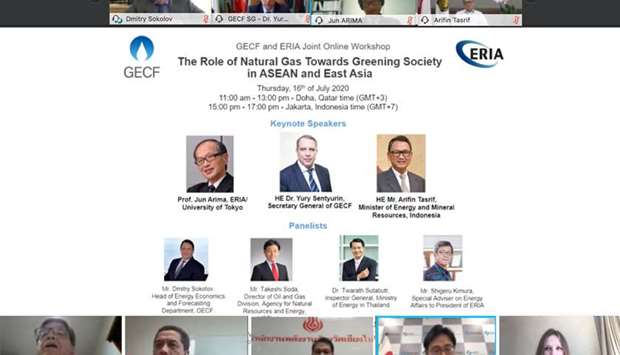The Gas Exporting Countries Forum (GECF) recently organised a joint online workshop with the Economic Research Institute for Aean and East Asia (ERIA) on ‘The role of natural gas towards greening society in Asean and East Asia’.
The discussion was held amidst changing energy demand patterns, particularly in the light of Covid-19, and explored the Asean’s ambition to propel its energy transition into clean energy systems using natural gas, while simultaneously addressing economic recovery, job creation, and climate mitigation.
The workshop featured high calibre speakers, including Arifin Tasrif, Minister of Energy and Mineral Resources, Indonesia, Prof Jun Arima, professor, Graduate School of Public Policy, University of Tokyo, Japan, Takeshi Soda, director, Oil and Natural Gas Division, Agency for Natural Resources and Energy at the Ministry of Economy, Trade and Industry, Japan, Dr Twarath Sutabutr, Inspector General, Ministry of Energy, Thailand, and Shigeru Kimura, Special Advisor on Energy Affairs to the President of ERIA.
GECF Secretary General Yury Sentyurin welcomed the audience and shared his delight with the participants on Malaysia becoming the first member from the Asean region to join the Forum, which now spans 20 members and four continents.
Highlighting the importance of cooperation amongst natural gas consumers and producers as a bedrock of gas market stability, Sentyurin also specified that the GECF strives for natural gas supply and demand security for the Asean and East Asia, which is in line with the unanimously supported 2019 Malabo Declaration at the outcome of the 5th GECF Summit.
Headlined ‘Natural gas: Energy for sustainable development’, the declaration demonstrates the GECF Member Countries’ resolve to strengthen global energy security as reliable suppliers of natural gas to the world’s growing energy demand, he said.
Sentyurin stated: “Our projections show that over the next three decades natural gas consumption in the Asean and East Asia region will more than double, rising from 736bn cubic metres (bcm) in 2019 to around 1,500 bcm by 2050. Its share in the energy mix of this currently coal-led region is projected to grow from a modest 10% at present to over 15% by 2050.”
Speaking about Indonesia, Tasrif referred to Indonesian President Joko Widodo’s pledge at the 21st COP Meeting and the Paris Agreement (both in 2015) to commit to reduce greenhouse gases in Indonesia by at least 29% by 2030, and using the clean attributes of natural gas to achieve that goal.
“Today, we are shifting from an oil dominion to gas dominion. We are trying our best to find more gas resources and find effective ways to transfer the resources to become proven reserves. In 2019, Indonesia’s total gas production was 6,138 mmscf (million standard cubic feet per day) which came from various sources, in Sumatra, Java, Papua. Moreover, the government is also developing gas supply to meet the ever-growing demand. We are also ensuring that upstream of gas activity is still effective for investors.”
According to the Minister, Indonesia is attaching priority to the use of natural gas by investing in programmes such as Gas Price for Industry, Conversion of Diesels to Natural Gas for Power Plant Use, Development of Gas Pipeline Infrastructure, and City Gas, to name a few.
“By optimising natural gas utilisation, Indonesia would have a future target that will enable natural gas to take 22% of its share in the energy mix by 2025 and 24% by 2050. Natural gas will become the future of clean energy together with renewable energy,” he said.
Dmitry Sokolov, head, Energy Economics and Forecasting Department at the GECF, also spoke on the occasion and talked about natural gas supply and demand worldwide as well as the ‘GECF Global Gas Outlook 2050’.

